As Malaysians, we’re familiar with multiple cultural festivities but, for those who do not celebrate it, did you know that Ramadan is the most sacred month for Muslims? Celebrated in the ninth month of the Islamic calendar, Muslims fast from sunrise to sunset during Ramadan to “commemorate the revelation of the Quran”, thus growing more spiritually and building a closer relationship with Allah.
We’ve covered how to troubleshoot your fasting-related beauty problems, shared 10-minute Sahur meal recipes, as well as rounded up some of the best Ramadan buffets in KL this year. One of the other common misconceptions is whether one should exercise when observing a fast. Thankfully, three Malaysian personalities—Cik Manggis of girl group De Fam; Ain Ramli, a trainer, ex-national rower and F-EMS Specialist at TecNatives Malaysia; and Nana Al Haleq, celebrity wellness and fitness coach—have the answers, tips and tricks for those looking to stay fit and healthy during the Holy Month of Ramadan.
What are your top tips on how to work out and stay healthy during Ramadan?
Cik Manggis

“Set broad goals for the month—I post my goals up on the wall so I can always see them and stay motivated every day!
Find the best time to work out that suits you—This may sound impractical, but I love getting up a little earlier in the morning to fit in a workout session before sahur. Morning workouts really help to give me more energy throughout the day. Otherwise, we can always push ourselves a little more in the evening (before sunset), knowing that we’ll be breaking fast soon.
Avoid overeating—Eat small portions for sahur but opt for foods rich in vitamins and protein to help keep us energetic throughout the day.
Change the type of exercises—During this time, I love to focus more on breath training, meditation, balancing and flexibility. For a good sweat, I would just do bodyweight training.”
Ain Ramli
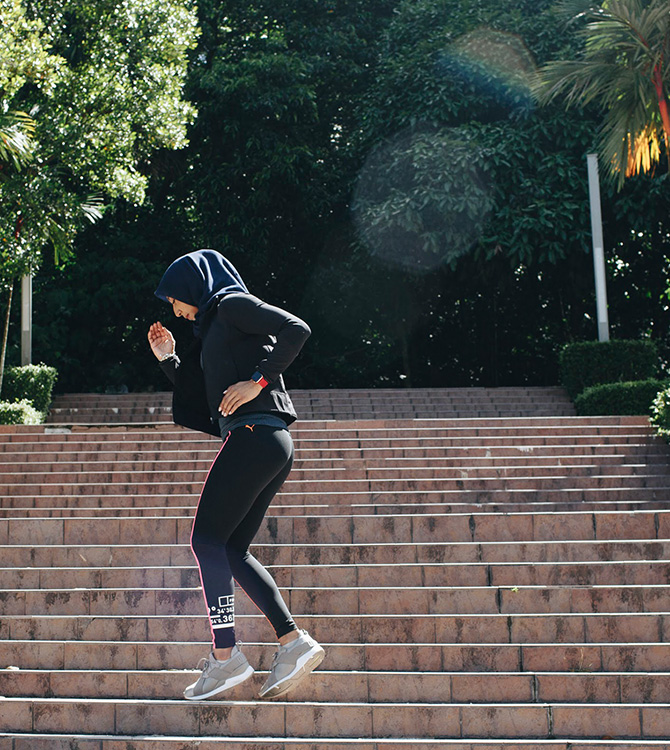
“Choose a training routine with a lower to moderate intensity—As compared to your usual routine, that is. However, if your fitness level permits, feel free to challenge yourself. Strength training is necessary, though, as it prevents muscle loss, so it’s imperative to include it still.
Never skip sahur—The most ideal food to opt for are those that digest slowly so you can feel full for longer, and the energy you get lasts longer too. Don’t forget your greens and fruits!
Eating healthy and eating enough—Food equals energy, so it’s essential to focus on caloric dense foods to get the most out of our feeding window. Many people gain weight during Ramadan because they consume food that is high in sugar and fats. Moderation is key, so one seri muka or tepung pelita is fine—just not the whole packet.
Water intake—Since we can’t drink water while wasting, it can lead to dehydration. Minimise this by strategically planning your water intake during sahur, iftar and two hours before you sleep.”
Nana Al Haleq
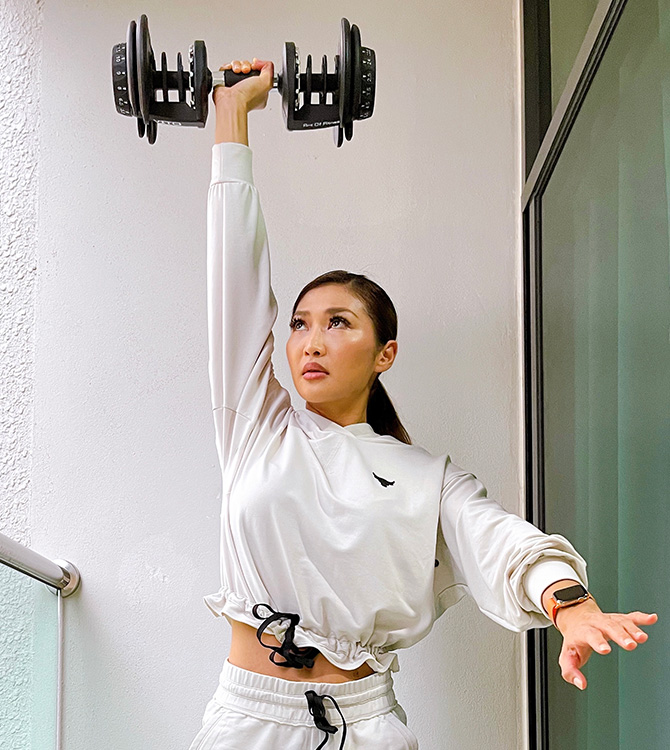
“When it comes to working out during Ramadan, the key to staying active is to pick a ‘time’ that best fits your schedule. Some would prefer to exercise before sahur and iftar. Others prefer to do it at night after terawikh. Here are my tips for each:
- Before sahur—Have a high caloric nutrient-dense meal during iftar and avoid high sugar and sodium meals. Meals or drinks that are high in sugar will increase cravings and hunger during the day, while high sodium meals will make you feel thirsty faster.
- 45 minutes before iftar—Keep your workout short and sweet (between 30 to 45 minutes) with a light to moderate intensity level. Strength training with a longer rest (1 to 2 minutes) in between sets is recommended instead of HIIT/Tabata/intense cardio-based workouts. This will allow your body to recover in between sets and prevent you from feeling thirsty. Break your fast then with a good source of carbs that won’t spike up your blood sugar levels too much. Red/brown rice and grains are good options. Avoid or limit your intake of dishes with refined carbs or sugar as those will make you bloat, feel sluggish and lazy. Eating good protein (free-range chicken, grass-fed beef, fish) will help fuel and repair your muscles, ensuring you feel fuller for longer.
- After terawikh—Be sure to end your workout session at least one hour before bedtime. Avoid vigorous training such as high-intensity interval training. Moderate intensity training helps people fall asleep faster and spend more time in deep sleep. Set a regular bedtime and adopt a relaxing bedtime routine. A gentle yoga flow will be as effective to keep you active and healthy during Ramadan.”
We hear that the Apple Watch is helpful even during this period. How so?

Cik Manggis: “Yes, it helps me plan and execute my workout routines. I can’t calculate how many calories I burn from a workout, but the Apple Watch can, so it gives me a great indication. Plus, it has an excellent heart sensor!”
Ain Ramli: “I’ve been using the Apple Watch for years, and it’s not just a great fitness tracker. I fully utilise its other features too, which help me improve my fitness goals in different aspects. It being able to accurately track how many calories I burn during a workout is an additional booster for me.”
There are so many apps that help us with various aspects of our lives today. Are there any that you can recommend for staying fit and healthy?
Cik Manggis: “Rather than third-party apps, the Activity Rings and Workout app do so much for me already. The Activity Rings help me effectively keep track of my weekly personal goals, while the Workout app recognises a wide range of workouts. I use it even when I dance or skate!”
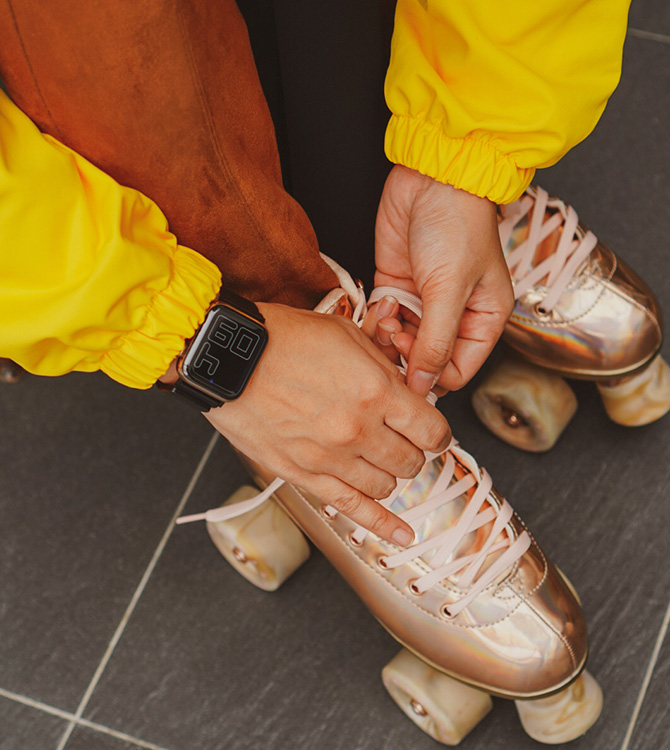
Ain Ramli: “I have a few favourites…
- 7 Minute Workout—No equipment needed. You just need to spare a few minutes, which is especially relevant during Ramadan. A short workout time is enough to make you feel more productive during the day.
- WaterMinder—It keeps track of my water consumption based on my body weight, which is crucial during Ramadan to avoid dehydration. I love how it has an app on the Apple Watch, so it’s super convenient.
- Lifesum—This app helps me keep my nutrition in check with sustainable steps, so I can make better food choices and reach my health goals.”
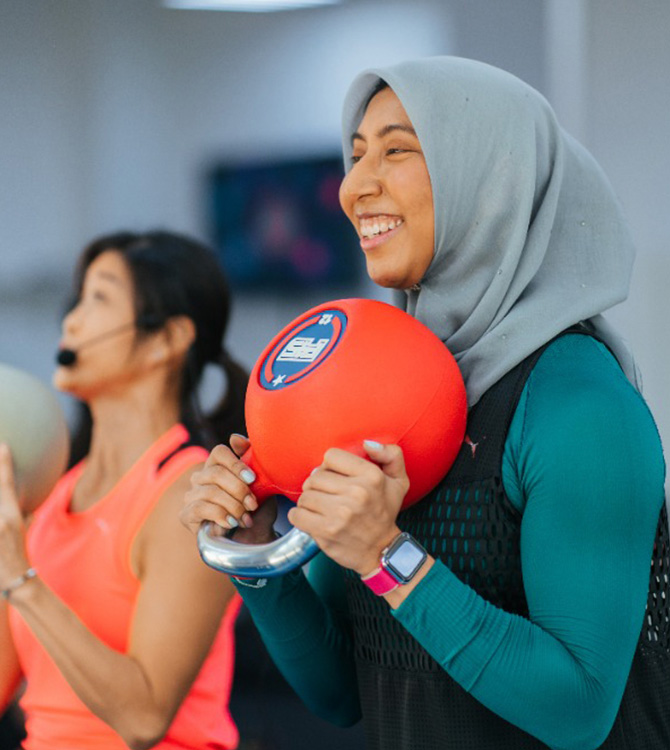
Nana Al Haleq: “The Apple Watch itself has many features that assist me daily. It keeps me updated on my schedule and everyday tasks. I can time my resting period in between sets with the Timer. The Workout app keeps track of all my workouts, be it yoga or HIIT. When I’m on the go, Siri helps me check the iftar and sahur time. When I’m driving, or on the go, it’s so easy to get in touch with my loved ones with it.”
What is your fitness routine during Ramadan like, and how is it different from your usual routine?
Cik Manggis: “During this period, I would decrease my workout intensity and lower my exercise goal. This is because I’m not focusing on the scale and progress. It’s more about maintaining my current fitness level and staying as healthy as possible.”
Ain Ramli: “For me, it’s all about maintaining muscles rather than gaining. Since we’re already in a caloric deficit, it’s easier to maintain than gain muscles. I strategise my workout in deficit to burn fat percentage and focus on mass muscle gain once it’s post-Ramadan. During Ramadan, I would try to train near ‘buka puasa’ time, so I’ll be able to rejuvenate and replenish my body immediately. And training time would be around 30 to 45 minutes, with a focus on heavy compound movements (strength) that hit every muscle effectively and quickly.”
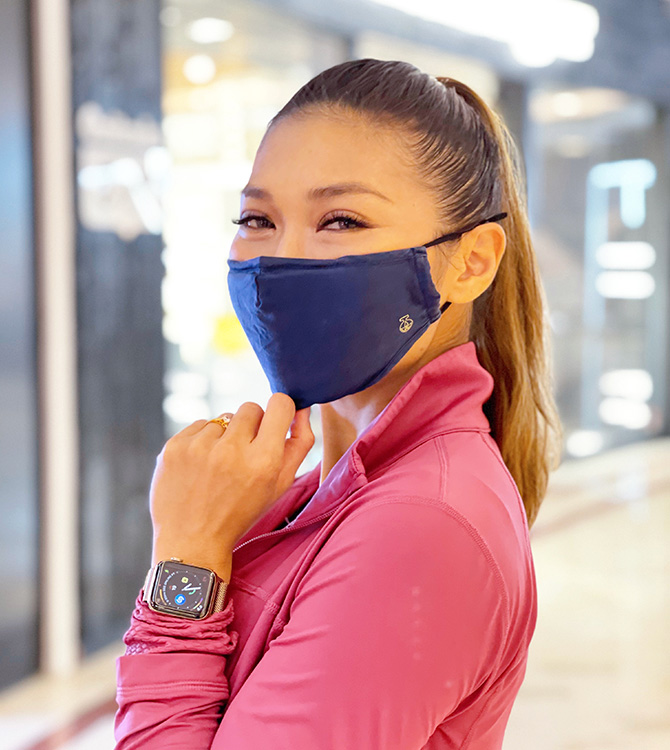
Nana Al Haleq: “I would usually train at noon as that’s when my energy levels are at its peak, but during Ramadan, my fitness routine would look something like this:
- On alternate days, I would train 45 minutes before iftar (break fast) as I find this timing fits perfectly in my schedule. Instead of a solid one-hour workout, I would only spend around 30-45 minutes on moderate-intensity strength training, with a 1- to 2-minute resting period between sets.
- On the days I don’t do strength training, I would dedicate 20 minutes to a mindfulness-based yoga session. I’d do this two hours before bedtime to help me de-stress, relax and heal my body.”
| SHARE THE STORY | |
| Explore More |




